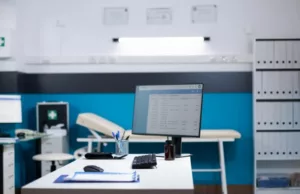Nestled between Ryhall Road and Sheepmarket, Lakeside Healthcare Stamford functions more like a dynamic environment than a fixed establishment. Although it continues to be a vital component of care for thousands, it has been undergoing an extremely difficult transition, growing digitally while balancing increased public scrutiny. Once commended for its community-centered care, this practice is currently being redefined by technology, patient demands, and the need to perform well across a growing healthcare organization. The end effect is remarkably similar to a beloved independent café that is suddenly run by a corporate chain—similar in name but fundamentally different.
Aiming to centralize systems across multiple locations in Lincolnshire, including Oundle, Corby, and St Neots, the practice, which is a part of the Lakeside Healthcare Group, is presently undergoing a transformation. This calls for a changing model for Stamford, one that blends localized service delivery with centralized management. It’s a delicate balance that, if not managed, runs the risk of offending the very patients it is intended to help.
| Category | Details |
|---|---|
| Name | Lakeside Healthcare Stamford |
| Address | Ryhall Road, Stamford, Lincolnshire, PE9 1YA, UK |
| Phone | +44 1780 437017 |
| Website | stamfordsurgery.co.uk |
| Branches | Sheepmarket and St Mary’s Sites |
| Group Affiliation | Lakeside Healthcare Group |
| CQC Rating | Requires Improvement |
| Services Provided | GP Appointments, Chronic Care, Prescriptions, Minor Procedures |
| Patient Portal | Doctrin Online Consultation System |
| NHS Profile | NHS Surgery Link |
| Registration | Open to new patients |
| Engagement | Patient Participation Group, Feedback Platforms |
In the last year, public opinion has fluctuated. Concern and gratitude alternate in patient evaluations. On the one hand, people commend seasoned general practitioners for their commitment to their careers. However, comments also describe a feeling of detachment, including lengthy phone lines, care continuity delays, and digital systems that seem more like gatekeepers than guides. It serves as a reminder that accessibility can be either incredibly effective or incredibly obtuse when filtered through technology.

While some service areas have improved, others are still experiencing stress, according to the most recent Care Quality Commission inspection. Not only did the practice itself receive a wake-up call from the previous report’s “Requires Improvement” rating, but the entire group did as well. It emphasized that patient connection cannot be replaced by size or scalability, particularly in a community like Stamford where people frequently know their general practitioners by name and remember care from previous generations.
The Patient Participation Group (PPG), which has played a particularly active role, has helped to make patient voices louder in recent days. Patients want more than speed in modern healthcare, and the group’s support for a better balance between digital convenience and human interaction reflects this trend. They seek approval, affection, and comfort. Health issues require human attention that goes beyond filling out forms, much like how online bank customers still prefer the opportunity to talk to a real person when they are experiencing financial stress.
Lakeside is working to change that narrative through internal reorganization and strategic alliances. To make up for shortages, more locum physicians have been hired. To help patients use digital tools more confidently, training sessions are being considered. Although not yet revolutionary, these actions are very positive. They stand for a readiness to listen, adjust, and reestablish trust—qualities that are incredibly potent but frequently underestimated.
Rapid digital transitions were a challenge for many practices during the pandemic. Stamford by the lake was no different. What transpired, however, showed something more profound: patients desire meaningful engagement, not just quicker access. Because their methods haven’t been automated, doctors like those who have been employed at Sheepmarket for years are still trusted. They are aware of the emotional significance of each symptom as well as the family background and medical file.
Lakeside Healthcare Stamford could be considered a case study in relation to NHS restructuring. It has been said that consolidated healthcare models are sustainable and economical. However, local execution, not national policy, is what will determine their success. For a system to be as effective as a well-tuned choir, every voice—particularly the patient’s—must be heard.
Perhaps surprisingly, the voices of celebrities have impacted this discussion. For instance, Davina McCall’s support of menopause awareness and Stephen Fry’s candor regarding mental health have served as a reminder to the public that general practice is still the first and most individualized line of care. These reminders highlight the importance of successful general practitioner offices, especially those that embrace innovation without sacrificing their human essence.
These insights provide a template for a practice such as Lakeside Stamford. There is already potential. The backbone is the staff, many of whom receive constant praise in reviews. Despite its flaws, the digital infrastructure is already in place. All that is left is a concerted effort to incorporate technology without compromising usability.
Exceptionally flexible care models, such as those that combine face-to-face consultations with effective digital pathways, are now expected rather than experimental. Stamford is in a unique position to lead this model because of its demographic mix of young families, retirees, and remote workers. Its systems could be used as a model for hybrid general practice across the country if they are improved with compassion and consistency.
Lakeside Healthcare Stamford can become a center of recovery by incorporating feedback loops, improving patient education, and upholding open communication. Although that path won’t happen right away, it is totally doable with thoughtful reforms and caring leadership. Reaffirming trust will be the focus of the next phase, not just platforms or procedures.

2 Comments
Pingback: Doctors at Sheepmarket Surgery Stamford: Behind the Reception Curtain - Route to Resilience Health UK
Pingback: What Patients Really Say About Lakeside Healthcare Corby: A Deep Dive into Reviews and Reform - Route to Resilience Health UK